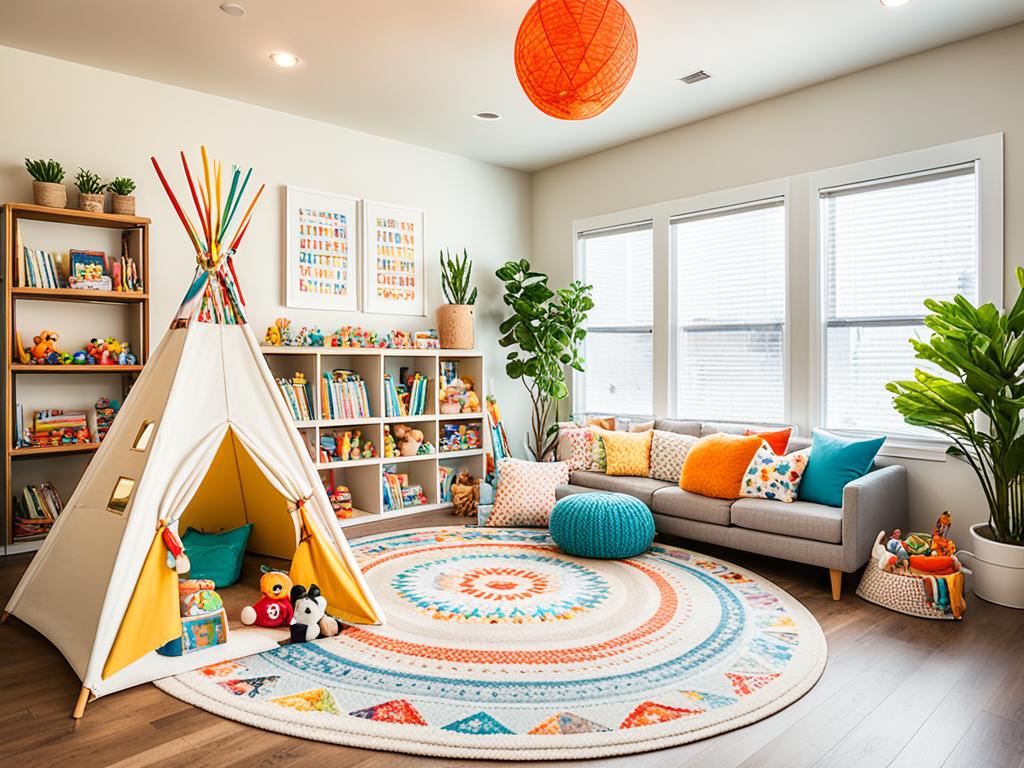
Parenting Tips for Raising Happy, Healthy Kids
Parenting is a journey full of joy, laughter, and the chance to shape young lives. It doesn’t matter if you’re just starting or have been doing it for years. This guide is packed with tips to help you through the ups and downs of raising kids. You’ll learn how to create a caring home and use positive ways to discipline your children.
Creating a safe, supportive, and loving home is key to good parenting. Putting your child’s health and feelings first sets them up for a great future. This article will show you how to make your home a place where your kids can grow and flourish.

This guide also talks about the importance of empathy and understanding. Parenting is more than just making rules. It’s about building a strong bond, listening well, and giving your kids the emotional support they need. By being kind and compassionate, you’ll create trust and open communication in your family.
Fostering a Nurturing Environment
Creating a nurturing environment is key for your child’s emotional and social growth. It’s about making a safe space where they feel secure and loved. This helps them feel free to explore the world. Attachment parenting shows how important it is to care for your child in a responsive and empathetic way.
Creating a Safe Haven
A safe haven is where your child can grow and thrive. Start by making your home child-friendly. Make sure it’s safe, fun, and full of things to learn and play with.
It’s also important to make your child feel emotionally secure. Be patient and understanding when they need you. Talk with them, listen, and make them feel their feelings are valid. This helps them learn how to handle tough times.
Parenting: Responding with Empathy and Understanding
Attachment parenting values empathy and understanding. When your child shares their feelings, really listen and accept what they say. This makes them feel important and builds a strong connection with you.
By building a nurturing space, you’re doing more than just meeting their needs now. You’re setting them up for emotional health later on. With a safe place and empathy, your child will grow into a confident and resilient person.

Parenting: Positive Reinforcement and Discipline Strategies
Being a good parent means finding the right mix of positive reinforcement and discipline. Using positive reinforcement helps encourage good behavior and builds a growth mindset in kids. Thoughtful discipline teaches kids self-control and responsibility.
Positive reinforcement is key to managing behavior well. When parents praise their kids for doing well, it makes them want to do it again. This makes kids feel important and helps them see learning as positive.
- Identify and praise specific behaviors you want to encourage, such as sharing, completing chores, or showing kindness.
- Use a variety of reinforcement methods, such as verbal praise, small rewards, or special privileges, to keep your child engaged and motivated.
- Consistently apply positive reinforcement to solidify desired behaviors and create a growth mindset in your child.
Discipline should also teach and guide, not just punish. These strategies help kids see how their actions affect others and teach them to control themselves.
- Use natural and logical consequences to show your child how their choices affect others. For example, if they don’t clean up, they might not play with toys later.
- Help your child solve problems by asking them to think of other solutions and what might happen with those choices.
- Encourage your child to own up to their actions and fix things when they can, teaching them to be accountable.

By using positive reinforcement and smart discipline, parents can help their kids manage their behavior and grow. This approach helps kids make good choices, control themselves, and do well in school and life.
Parenting: Balancing Boundaries and Freedom
Finding the right balance between setting rules and giving freedom is key in parenting. As kids grow, they want more independence and to take on more responsibility. But, they still need the security and guidance of their parents.
Parenting: Establishing Age-Appropriate Rules
It’s vital to set rules that fit your child’s age. These rules should be clear, consistent, and reasonable. This way, your child knows what’s expected and what happens if they don’t follow the rules. Setting these boundaries helps your child learn discipline and self-control.
Encouraging Independence and Responsibility
It’s just as important to let your child be independent and responsible. Give them chances to make their own decisions, solve problems, and own their actions. This helps them feel autonomous and builds important life skills.
- Gradually increase the level of freedom and decision-making opportunities as your child matures.
- Encourage your child to take on age-appropriate chores and tasks to build a sense of responsibility.
- Praise and celebrate your child’s achievements, instilling a sense of pride and confidence.
By finding the right balance between boundaries and freedom, you help your child grow into a responsible and independent person. This prepares them for a successful and happy future.

Family Dynamics: Togetherness and Quality Time
In today’s fast-paced world, it’s easy to overlook the value of family time. Yet, building strong family bonds and sharing experiences is key for a child’s emotional health and the family’s overall well-being.
Parenting: Strengthening Bonds through Shared Experiences
Engaging in activities together is a great way to bond with your family. It could be a weekly game night, regular park visits, or an annual camping trip. These moments help families make lasting memories and grow closer.
Simple activities like sharing meals, reading before bed, or evening walks also bring families together. They create a safe space where kids feel loved and important.
- Prioritize family time by setting aside dedicated hours or days each week
- Engage in activities that everyone can enjoy, such as cooking, hiking, or board games
- Establish family traditions and celebrate milestones together
- Encourage open communication and active listening within the family
By focusing on these family dynamics, you help your child grow emotionally and socially. You also support a healthy balance between work and family life for everyone.

Promoting a Growth Mindset
Helping your child develop a growth mindset changes how you parent. It teaches them to see challenges as chances to grow and learn. By building resilience and perseverance, your child can get through tough times and reach their goals.
Cultivating Resilience and Perseverance
Resilience and perseverance are key for your child’s future success. You can build these qualities by:
- Encouraging a positive outlook: Show your child that setbacks are just temporary and can be overcome. Praise their hard work and progress, not just the outcome.
- Modeling problem-solving skills: When you face challenges, show how you handle them with a calm, focused approach. Ask your child for their thoughts and ideas.
- Celebrating small wins: Acknowledge and celebrate your child’s efforts, even the small ones. This links hard work to success, boosting their confidence and motivation.
By promoting a growth mindset, you help your child tackle challenges, keep going through hard times, and reach their highest potential. This positive way of parenting sets the stage for a life of resilience and achievement.

Co-Parenting: Teamwork and Consistency
Co-parenting is key to raising happy, healthy kids, whether you’re together or apart. This part talks about how working together, talking well, and being consistent helps. It’s about making a strong parenting team.
When you work together and look alike, your child gets a loving and steady home life. Co-parenting means teamwork and sticking to consistency. This helps your child grow and develop well.
- Keep in touch often with your co-parent to talk about your child’s needs and plans. Make sure you’re on the same page about discipline and what you expect.
- Have a steady schedule that your child can count on, whether they’re with you or someone else. This gives them a sense of safety and security.
- Understand the need for a good work-life balance and help each other out. This makes sure your child gets the love and care they need.
- Celebrate your child’s big wins and important moments together. This brings you closer and shows your shared love for their happiness.
By living by co-parenting, teamwork, and consistency, you make a caring space for your child to grow and thrive. This teamwork is the base for a healthy, caring upbringing.
Conclusion
This article has shared key insights for raising happy, healthy kids. It talks about creating a caring home, using positive discipline, and building a growth mindset. It also highlights the importance of family connections.
Each child is different, so it’s important to tailor these tips to your family’s needs. With time, effort, and a strong focus on your child’s well-being, you can handle parenting’s ups and downs with ease.
The secret to good parenting is finding a balance. Offer a safe space, show empathy, and encourage your child to be independent and responsible. This approach helps build resilience, strengthens family ties, and supports your child’s overall well-being.
FAQ
What are the key elements of a nurturing environment for children?
A nurturing environment for kids means making a safe space. It’s about showing empathy and understanding. It also means making them feel secure and attached.
This approach helps kids feel loved and valued. It boosts their confidence in growing up.
How can parents use positive reinforcement to encourage desired behaviors?
Positive reinforcement is key for managing behavior. By praising and rewarding good actions, parents help kids develop a positive mindset. This encourages self-control and responsibility.
What is the importance of establishing age-appropriate rules and boundaries?
Setting clear rules and boundaries gives kids a sense of security. It also helps them become independent and responsible. Finding the right balance between rules and freedom is vital for their growth.
How can families prioritize quality time and strengthen family bonds?
Doing things together, sharing traditions, and daily rituals can strengthen family ties. It gives kids a sense of belonging and emotional health. Making time for each other is key for a child’s well-being.
What strategies can parents use to cultivate a growth mindset in their children?
To build a growth mindset, encourage resilience and perseverance. Show them the value of effort, learning, and getting better. This helps kids tackle challenges and reach their goals.
What are the key principles of effective co-parenting?
Co-parenting works best with teamwork, good communication, and consistency. When parents or caregivers work together, they give their child a consistent and caring upbringing.



Great parenting guide. Bring up a child together as a team has a great and positive impact on such child.